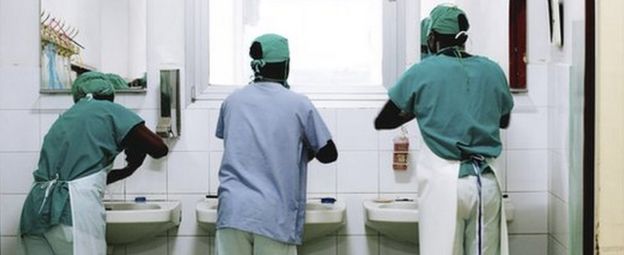You are here
Back to top'Twice as many die' in Africa after surgery

'Twice as many die' in Africa after surgery
BBC - Patients undergoing surgery in Africa are more than twice as likely to die following an operation than the global average, researchers say.
But they say the most worrying revelation was just how few Africans have access to elective surgery - surgery that is scheduled in advance.
The number of these operations is 20 times lower than the demand, the study in the Lancet medical journal says.
They call the deficit a "silent killer".
Prof Bruce Biccard, a co-author of the study from the University of Cape Town, told The Guardian the main problem was a lack of medical staff and facilities to spot complications after the surgery.
"[The reason] that people do so terribly in Africa from a surgical point of view is that there are just no human resources," he said.
Globally, an average of 1% of patients die after surgery, but researchers say this number rises to 2.1% for patients in Africa.
Post-surgery survival rates are lower in Africa than the global average despite patients there being younger and lower risk, the report says.
Patients in Africa also mostly undergo surgery that is "more minor" and have "fewer complications".
The most common surgery is caesarean delivery, which accounts for 33% of operations. Infection was the most common post-surgery complication, researchers say.
It was the largest study of its kind ever undertaken in Africa, analysing data of 11,422 adult patients across in 25 countries - including Ethiopia, Nigeria, Egypt and South Africa.
No comparisons between those different African nations are available, however, "because of lower-than-expected surgical volumes" researchers say.

This study builds on the work of the Lancet Commission on Global Surgery which last year found 5 billion people around the world don't have access to safe surgery.
In sub-Saharan Africa, fewer than 1 in 10 people can get basic surgical care. But even when they do, complication rates are much higher than other parts of the world.
This all comes down to weaker health systems, fewer medical staff, and patients not having access to the full care they need. Having surgery isn't just about the medical procedure, it's about aftercare.
Patients should be properly monitored after surgery, but that can be very difficult with families often living many miles from their nearest health centre, and struggling to afford follow-up appointments.
Also, as the authors themselves state, "increased surgery is important" but "it is essential that these surgical treatments are safe and effective".
If resources aren't available for safe surgery, complication rates - inevitably and unnecessarily - become higher.







